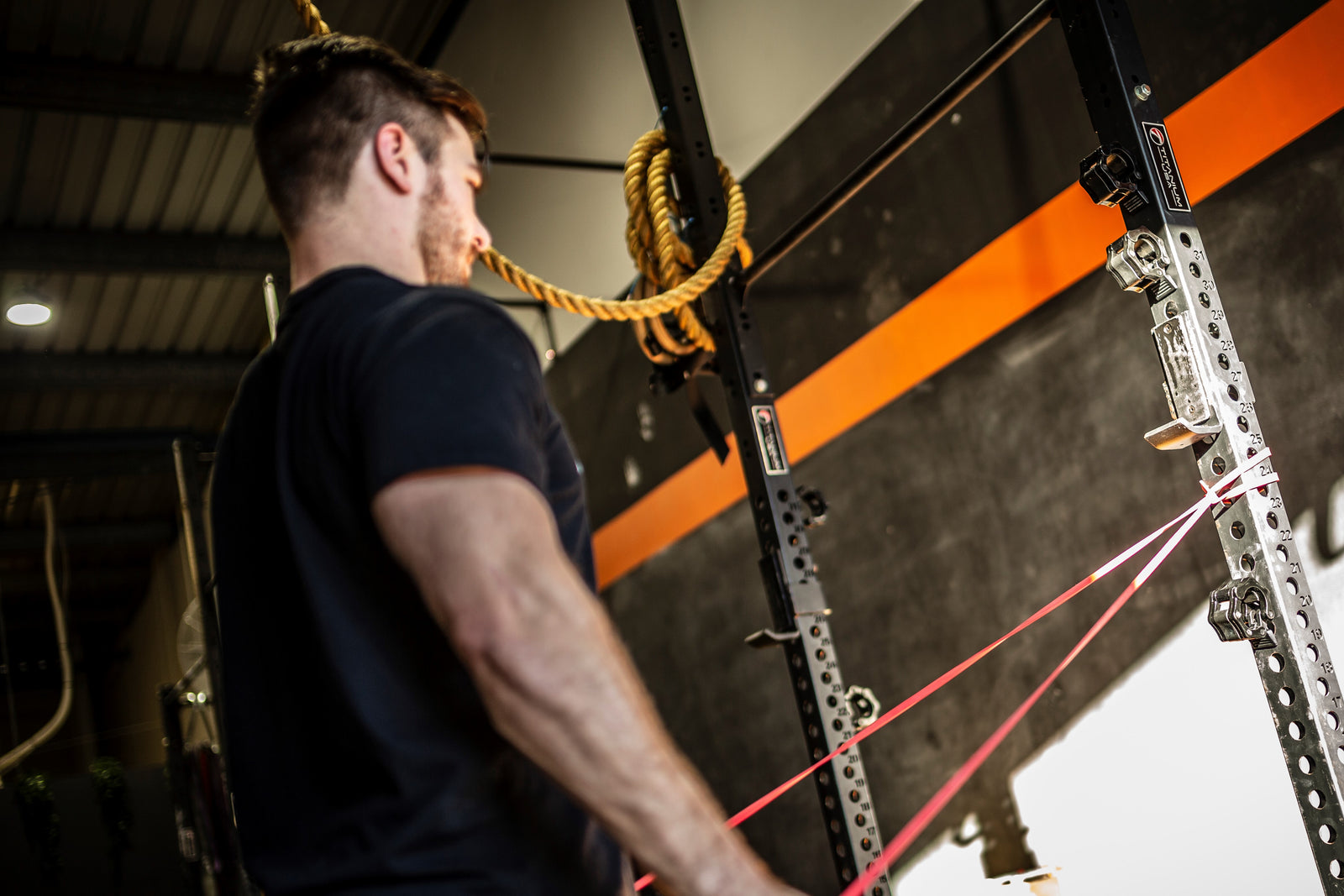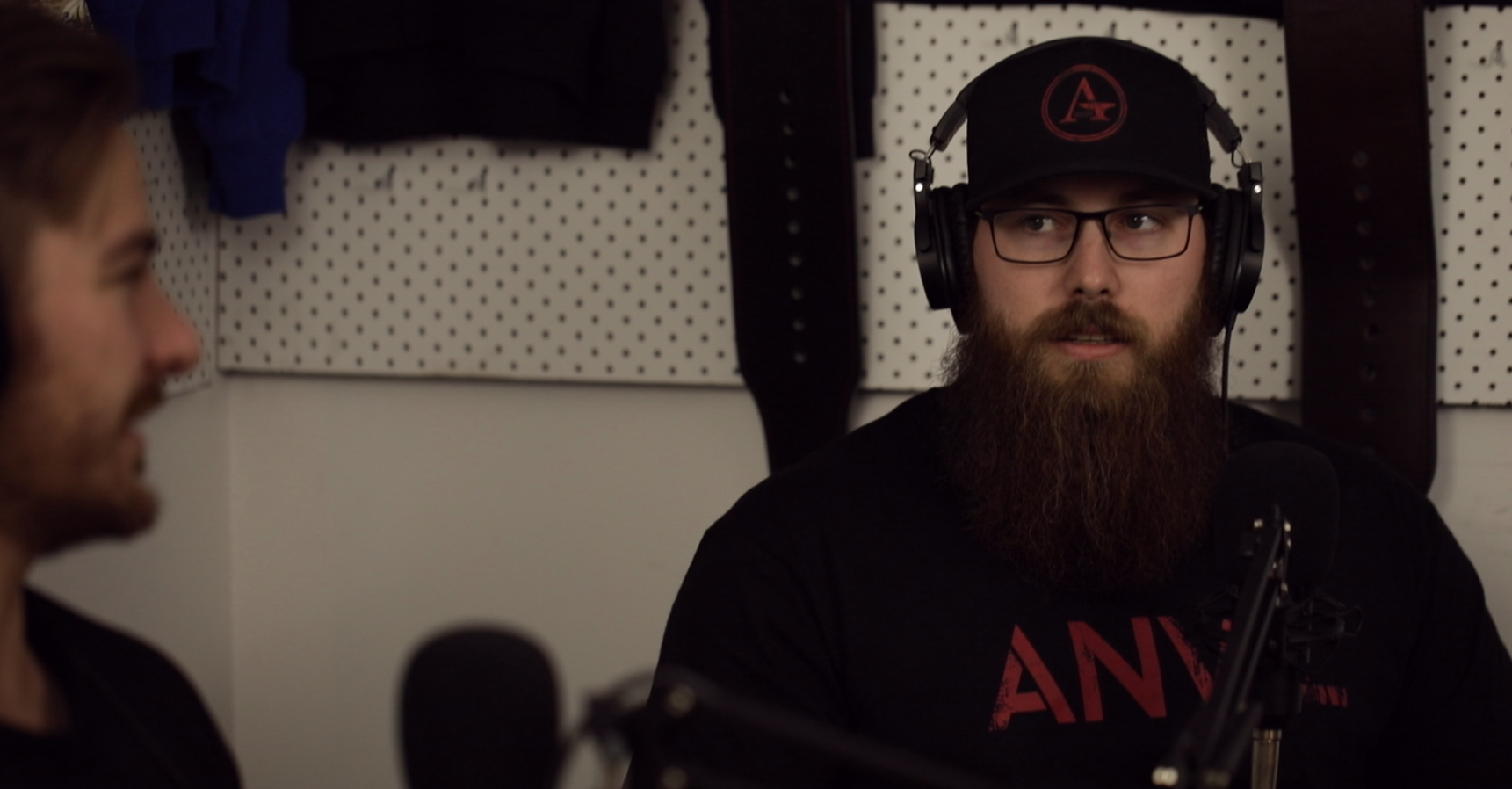Mentality, Mindset, and Failing Forwards - Anvil Training Series 9

By Marshall Officer
What is the Anvil Training Series?
The Anvil Training Series is a series of 12 articles throughout 2020 about key training concepts, written for the general reader. Physical training, in some form or another, should be a part of everyone’s life. Most of the basic concepts are very easy to understand and implement, although these days - the industry has become muddied with complicated variations of basic concepts that can make choosing how to train quite intimidating. These articles are here so that you don’t need a degree and ten years’ experience to separate what matters from what doesn’t, and aim to help you navigate the muddy and ever-changing waters of the online fad fitness industry.
Introduction
I’ve never been described as the most encouraging person. When I was an infantry soldier in the military, encouragement was actively discouraged - it was your own responsibility to push yourself hard enough to keep up, and a 10/10 commitment level was expected regardless of the activity performed. The team was the priority, with the individual being expected to push themselves harder and further for the sake of the team - motivation to do so came from not wanting to let the team down, or be seen as the one holding everyone back. This meant that group positive reinforcement was almost unheard of - there was just no place for that kind of thing in an infantry unit. Team mentality was an effective way to motivate people, and led to a very high standard of soldiering in the sections and platoons I was in - however it was not an effective approach for everyone. Individuals who responded to this form of external motivation thrived, and those who didn’t ended up leaving (or suffering injuries, or even being pushed out). Now that I have left the military and am in a coaching role where motivation and mindset play a key part in ensuring my client’s success, I have come to understand that there is no one-size-fits-all solution.
I’m still not the kind of person that provides a lot of positive reinforcement - if you ask any of my clients about the kind of encouragement I provide, they may say nothing is ever good enough, or no matter what they do - there is always something to be fixed or worked on. If I am being honest, I don’t think I will ever be the kind of coach that runs a group class with a bubbly personality, spewing forth positivity in an attempt to keep everyone motivated. However, I do place a high level of importance on motivation, mindset, and the right attitude towards failure. In my opinion, true success is not as simple as getting something right, winning, or setting the bar so low there is no risk of failure. To me, success is defined as an almost endless series of failures, setbacks, and obstacles that must be overcome. It is the person that refuses to give up, no matter how many times they get knocked down. And, it is the person who sees failure as an opportunity to learn, reflects on their mistakes even when things go well, and never accepts second best. Success is never-ending failure, learning and, inevitably, progress.
How Mentality Affects Your Training
When I was an instructor at the School of Infantry, it was my job to push people past what they believed they were capable of. It made me reflect on my time as a brand new infantry soldier, and how it felt to learn what my body and mind could do. It has been suggested that human beings don’t really ever operate at full capacity - that we have a far greater untapped potential than what we access on a daily basis. However, nobody ever tells you that accessing even a fragment of this potential is one of the most unpleasant experiences you could have. When it comes to training, there are no substitutes for hard work, and your specific mindset towards this can be the difference between short- and long-term success, or never achieving the goals you’ve set for yourself. Anyone can turn up to the gym once, but are you willing to do it every day for 6 weeks, if that’s what it takes to achieve your end result? Anyone can do three days a week, but if your goals require five days of training, or seven - are you capable of making the changes required? Anyone can lift weights, but if you want to set a world record, are you willing to go further than everyone else?
It’s easy enough to answer ‘yes’ to any or all of these questions from the comfort of your couch. Mentality and discipline influence your training, because the only one who decides whether you’re willing to turn up is you. The real test of your overall mentality isn’t whether you turn up on the good days, or all the days you feel like it - the days you can guarantee success. You are challenged most when you show up to do what’s required, to the best of your ability, on your bad days. It means getting up for those sessions even when you don’t feel like it, when everything feels wrong, too hard, or you’re afraid to fail.
I want to clarify what I mean when I refer to having the ‘right mentality’. It’s not the infantry mentality of pushing yourself past the point of no return every day. It’s not ignoring pain, or forcing yourself through sessions that do more harm than good, or training when you need to recover. Having the right mentality and turning up means keeping your goals in mind twenty-four hours a day, seven days a week. This applies to every facet of training and recovery - not just the time spent in the gym or on the track, but having the same level of discipline in your time spent recovering, sleeping, and eating. It’s pulling back when you feel an injury flare up, so you can continue to train for the rest of the week or the rest of the month. It’s choosing the right foods, drinking the right amount of water, getting to bed early, and managing your stress in every aspect of your life. The best mentality for training isn’t one that you just have when you’re in the gym - it’s a mentality that extends to any aspect of your life. It’s easy when things are easy - but it matters most when everything gets hard.
The Right Attitude - Positivity versus Realism
A positive mindset is fantastic when everything is going well. In fact, the power of positivity has been proven time and time again - not just in our daily inconveniences, but in situations when all hope feels lost, when lives are on the line, or when basic survival seems impossible. ‘Man’s Search for Meaning’, a book by Viktor Frankl, is about his time spent in concentration camps during the Holocaust in World War II. He went on to establish the school of psychotherapy known as Logotherapy - grounded in the belief that an individual creates and pursues their purpose as their primary source of motivation in life. In my opinion, his tale of survival motivated by the discovery of purpose during his darkest times is not a story explaining the ‘power of positivity’. Whilst his story demonstrates the possibilities of adopting a certain attitude or mentality and applying it within your personal situation, that attitude must be based, to at least some extent, in reality. For example, if I want to set the all-time world record for the squat next year, but I am currently unable to complete a competition depth barbell back squat with more than just the bar on my back - it would be unrealistic. No matter how positive my mindset, without a grounding in reality - I am setting myself up for disappointment and failure. One of the primary concepts of goal setting, taught to anyone with a qualification in physical training, is that goals must be realistic. I would never tell a client they can’t do something, and I’m certainly not encouraging self-limitation. However, it is my responsibility to ensure that they understand whatever goals and time frames they set must be realistic, or they are doomed to fail. A key step to long-term training success (and personal growth) is understanding that a positive attitude isn’t worth nearly as much as a realistic attitude.
What Defines Failure?
From a fixed mindset perspective, failure is final. It is the end. There is nothing else afterwards. I prefer the alternative - failure is inevitable and an opportunity to learn. Excluding disaster-level events that prevent any possible progress (such as an athlete suffering an injury severing the spinal cord irreparably, becoming a quadriplegic), an avenue for progress should always remain open to the creative athlete. As a veteran, I left the military with a number of injuries. None of my injuries have been serious enough to stop me from lifting. However, I am constantly impressed and motivated by members of the veteran community who have suffered serious injuries, including loss of limb or traumatic brain injuries resulting in loss of motor control, but have not let that get in their way of competing on the world stage. I have seen individuals with leg amputations with a bigger squat than almost anyone I know, and some with arm amputations with impressive bench presses. True failure is defined by a person who has given up looking for a new avenue to achieve their goals. Of course, there are situations that may make previous goals impossible, but as I covered in the earlier paragraphs - goals should be constantly reassessed to remain realistic and achievable. Limitations are seen as opportunities to learn and grow, and as such - any failure becomes a new chance to ask yourself how you plan on moving forward, despite what has been thrown at you. Obstacles are not put in your way to stop you, they are there to challenge you to become better than you were before. You have the ability to define what failure is to you, and if you can define it as an opportunity to turn a weakness into a strength - then success becomes inevitable.
How to Fail Forwards
Following on from redefining failure, it is important to understand how to ‘fail forwards’. Those who see failure as an opportunity can just as easily fall into the trap of avoiding the very challenge they set out to defeat. Although obstacles may force us to reassess our goals and adjust our timeline, it is important that momentum is maintained in the right direction. For example, if I wanted to be a powerlifter, and I feel as though I can’t make any more progress in the squat, bench and deadlift - this is not an opportunity for me to become a strongman competitor instead. What does this mean? If I am willing to give up on powerlifting because the lifts become hard - do I really want to be a powerlifter? If the answer to that question is yes, then avoiding an activity because you feel like you can’t make any progress is admitting defeat. Instead, a way must be found to achieve success in line with your chosen purpose. This will be personal to you, and as I mentioned in the introduction - one size does not fit all.
Rather than failing “sideways”, or in other words, avoiding the task you feel is too difficult, a new plan must be made. I know that this may seem like a throwaway line, but to add a little depth to this topic: figuring out what you really want is not easy. A professional athlete may have multiple reasons to pursue excellence in their particular field. However, if you are willing to push the very limits of who you are for the sake of a career in a field where success is measured against others on a regular basis (as is every competitive sport) - there must be a deeper purpose. This kind of purpose should have relevance to those who train on a more casual basis as well. If you intend on exercising a certain way, and sticking to it for the rest of your life - then it should be something about which you are passionate. If this is the case, and you admit defeat when you stop making progress, suffer an injury, or don’t achieve the goals you’ve set for yourself - then your physical condition is not the problem, your attitude is. Whatever reason you have for training, you should want to be there. If you continue to show up and remain focused on why you want to be there, it speaks volumes about your faith in who you are, that you give up when it gets tough. Fail forwards, and fail often, because those who do will learn more and go further than anyone else.
Expectation Management
Following on from what I discussed above, it is not your coach’s responsibility to manage your expectations. It is not your parents’, your spouse, or your training partner’s responsibility either. It is yours, and yours alone. Your support network will fulfill a variety of roles, from support to keeping you focused, and most of all - education. A good coach does not tell you that you can or can’t do something. They educate you as best as possible, provide potential pros and cons, and then their job is done. Your success or failure is not their responsibility, however - it is their responsibility to provide the best possible environment and information for success.
What am I getting at with this? You are accountable to yourself for setting realistic expectations, and managing them as you progress through your training. Having a realistic attitude means not only setting realistic and achievable goals for yourself, but also managing your own expectations. Putting 2.5kg on your deadlift might not seem like a lot, but consistently putting 2.5kg on your deadlift every month for an entire year will leave you 30kg stronger and much less likely to injure yourself along the way. Many athletes, even myself at one point, believe that unless you are lifting 10kg more than last week, or you can bench 3 plates, or deadlift 200kg - then you are failing. Essentially, this is poor expectation management and will leave you constantly disappointed. It’s been said before, a thousand different ways - trust the process. Put faith in your program. Understand that one hundred little wins can take you further than one big win ever could.
Consistency, Not Perfection
I hope you have noticed a common theme by now. Most of these topics tie in very closely with each other. On the road to success, every step you take has an impact. If you spend your entire training career worrying about whether the next step you take will be the perfect one - you will never get where you want to go. Consistent steps will always get you further, faster, than perfect steps will. Of course, you want to try to achieve the most from every training session, every meal, and every night’s sleep. But, one of the most important lessons I ever learned is that you might have 10% amazing training sessions, and 10% terrible sessions, and the other 80% will be just average. Unfortunately, you won’t have any amazing, terrible, or average sessions if you never turn up in the first place. Therefore, consistency beats perfection every single time. Stop focusing on squatting 200kg, or benching whatever number you have in your mind, or hitting that olympic sprint time. Stop focusing on the world record, or the competition you have in 3 months, or even that injury that might be ‘setting you back’. Start focussing on turning up to every session, getting to sleep earlier, maximising your recovery, and just getting those meals in, and I guarantee - everything else will follow.
I also want to look at this from a competitive point of view. Not long ago, I heard about a bench press athlete who used a specific technique, allowing him to bench bigger weights than anyone else he came up against on meet day. Unfortunately, he almost needed the stars to align for that technique to work: the groove had to be perfect, the tension in his body “just right”, and the timing to be spot on. He benched more than anyone else, but he only hit one rep in every ten attempts he tried. He lost most of his meets. If you can consistently bench 225, it doesn’t matter if the other guy has a 1 in 10 chance of benching 230. You will still win 9 out of 10 meets. Not only do you win more, the more you can replicate your actions, the more progress you will make over time - leading to consistently bigger numbers eventually anyway. Consistency is key.
Growth Mindsets in a Training Context
For anyone unfamiliar with the term ‘growth mindset’, Carol Dweck (a leading psychologist known for her work on the mindset psychological trait) states there are two categories of mindsets - growth or fixed. In a 2012 interview, she said:
“In a growth mindset, students understand that their talents and abilities can be developed through effort, good teaching and persistence. They don't necessarily think everyone's the same or anyone can be Einstein, but they believe everyone can get smarter if they work at it.”
This doesn’t solely apply to education within a formal learning institution - but can be applied to any individual at any point in their life, trying to achieve anything. Training is essentially an educational process - where you teach your conscious mind that you are capable of something you previously couldn’t achieve, as well as your subconscious mind and physical body that it can do more. When we see training from an educational perspective, we can start to address some of the limitations we might put on ourselves. Instead of saying “I hurt my knee, I can never squat again”, you can say “I hurt my knee, so I am going to find a way to squat so I never hurt it again”. I believe the growth mindset is one of the most important attributes of a successful athlete. If every single limitation is reframed and perceived as a goal to be achieved, then failure loses its finality, and suddenly becomes an essential stepping stone on the road to eventual success.
The athlete with a growth mindset yearns for limitations, not because they want to fail - but because they understand that any sticking points or stalls in progress are just obvious weak points to be understood and addressed. Once recognised, these weak points can be developed into strengths, leading to growth that may have previously been seen as impossible. If you ever find yourself saying “I can’t…”, you have reached the first step in adopting a growth mindset. Every time you change your perspective, and create a plan to turn that “I can’t…” into an “I will…”, you take another step in the right direction.
Conclusion
I will keep the conclusion brief, because there isn’t much more to say on this particular topic. I want to finish by saying that the only person who is responsible for how far you do or don’t go, is you. Find your own personal approach - and recognise that one size does not fit all, but the responsibility to keep yourself accountable remains the same. Take that responsibility seriously, and accept everything that comes along with it. It won’t always be easy, and if it is - you’re not really trying. It won’t always be fun, it won’t always be interesting. And, more often than not - it won’t always feel like progress. But remember this: success is consistency over perfection, it’s embracing failure, it’s learning from your mistakes, it’s a growth mindset, it’s realistic goal setting, and most of all - it’s turning up again and again, no matter how many times you’re knocked down or set back.
Fail Forwards. Train Smart. Train Hard.
About Us
Anvil Training and Development is a group of Australian veterans who care about the physical and mental health of veterans and emergency service workers. We’re passionate about ongoing education and working with others to implement positive change.
Instagram: Anvil Training & Development - @anvil.td
Facebook: Anvil Training & Development - @anvil.td
www.anviltd.com
(Article Edited, Proof Read, and Fact-Checked by Charlotte Officer)
VES Mental Health Resources: https://anviltd.com/pages/ves-australian-mental-health-resources









Leave a comment